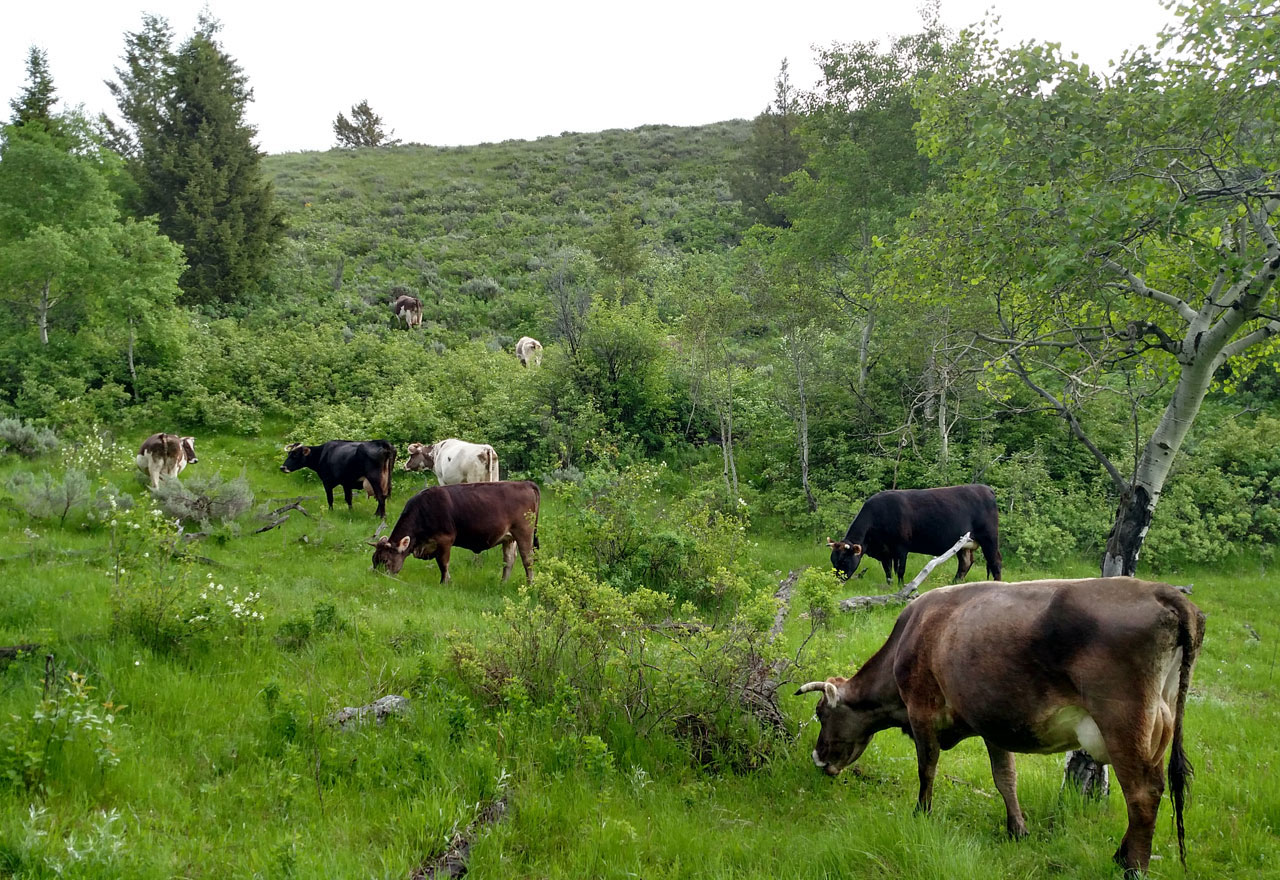When Mike Reid started Paradise Springs Farm in 1999 in Teton Valley, Idaho, the land was suffering from years of neglect. Now the soil is healthy, the fields retain more water, and the vegetation is vibrant and diverse.
As a dual-certified biodynamic and organic dairy, Paradise Springs Farm operates almost entirely as a closed system, recycling nutrients and organic matter among the soil, plants, and animals that make up the farm ecosystem and sharing this wealth with its loyal and local consumer base.
The herd of 15 Brown Swiss milking cows get the majority of their diet from carefully-managed pasture. All feed is grown on-farm—from the sprouted barley received as a treat at milking times to the alfalfa consumed during winter months. The few outside inputs needed are sourced from another organic farm in the community.
Paradise Springs is the embodiment of “continuous improvement,” and the cows do much of the work. Properly managed on over 100 acres, Reid’s herd helps regenerate the soil by rotationally grazing pastures, depositing nutrient-rich manure along the way.
“[Enhancing fertility by using the resources available on the farm] raises the quality of the soil, which in turn raises the quality of the plants, which raise the quality and health of the cows, which raise the quality of the manure—and the cycle starts again,” Reid says. “The closed system is the most practical in the long run and also the best for quality.”
A farm that is supported by its own ecosystem and surrounding community is more resilient in a crisis. While COVID-19 sent shockwaves through the industrial food system, it has had little impact on Reid’s business. In fact, the demand for local organic milk is up—even at $18 per gallon, delivered.
The value of the milk comes from the care and attention to the land, as well as a commitment to animal welfare. At Paradise Springs, cows are treated more like pets than livestock. “The most important thing here to me is the mutual love and respect that I have with my cows,” Reid says.
That relationship begins when each calf is born at Paradise Springs. Calves are a necessary part of any dairy because cows must give birth to lactate. But most dairies—even many organic ones—remove calves from their mothers after birth to maximize the volume of milk available for sale.
In contrast, Paradise Springs gives calves the opportunity to nurse during the entire lactation period of nine to 14 months.
A lactating cow on healthy pasture can produce more milk than a calf requires. The pastures at Paradise Springs are thick, biodiverse, and verdant. Reid’s small, pampered herd produces some of the very best milk, enjoyed by calves and humans alike.
Allowing calves bonding time with their mothers requires intensive management of land and animals, one reason few dairies follow this practice. For example, cows may be unwilling to “let down” their milk for the farmer when calves are present.
At Paradise Springs, after the calves free-nurse for a few weeks, Reid separates them from their mothers for a few hours before the evening milking. The calves are unable to nurse on their mothers but remain inside the grazing paddock, within their sight. The cows and calves are reunited during milking time, when the calf nurses from one of the mother’s teats while the farmer harvests the remainder. This strategy promotes milk letdown. Since the calves are not free-nursing continuously, the cows will let down their milk immediately when their calves resume nursing. Weaning happens gradually over the course of the entire lactation cycle.
Maintaining the relationships between calves and cows enhances animal welfare. Allowing the calves to suckle daily prevents mastitis and high somatic cell count. Not only do both the cow and calf prosper, they maintain the social and emotional connections that are essential for herd animals.
In order to keep the matrilineal lines of the cows intact—and sell milk—Reid balances the social and health needs of his cows with the cost of their care. And this sets Paradise Springs Farm apart.
While the price of Paradise Springs milk may give many pause, it reflects every component of this ecologically based agriculture system. From superior animal welfare to a nutrient dense product that gets better every year, Paradise exemplifies the type of high-bar farming that is increasingly attractive to consumers who can afford it. “Consumer awareness is key,” Reid notes. “When people recognize how insecure our conventional food system is, they want to buy into an alternative.”


